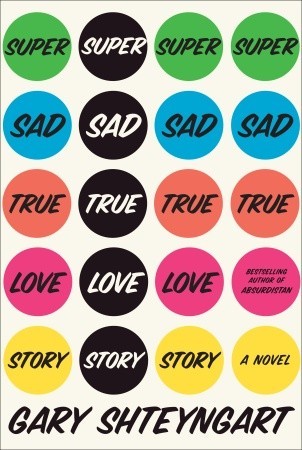The Boat Is FullIn author Gary Shteyngardt's near-future world, this message is hung from Credit Poles throughout Manhattan; shafts whose primary function is to display, on small LED screens, the credit rating of everyone who walks by. If that isn't enough information, everyone possesses an äppärät: the latest generation of smartphone -- now shrunk to pendant size -- that not only connects to the world but, for those who have RateMePlus, broadcasts (and ranks against th0se nearby) the owner's hotness, personality, sustainabilit¥ (that ¥ symbol acknowledging that the US, at this point, is basically owned by its Chinese creditors), and personal info. And if that still isn't enough information, the latest fashion is for women to wear nipple-less bras and see-through Onionskin Jeans -- with no panties, of course, but creative grooming and bejewelling of lady parts. In this TMI world -- where even the news is a self-filmed reality show, likely combined with porn or true-confessions for the ratings -- is it a wonder that actual human beings have trouble connecting with each other?
Avoid Deportation
Latinos Save
Chinese Spend
ALWAYS Keep Your Credit Ranking Within Limits
American Restoration Authority
"Together We'll Surprise The World!"
Leonard Abramov -- the 39-year-old son of Jewish Russian immigrants -- sells immortality treatments to the super-rich. Balding, out of shape, and one of the last readers of actual books, Lenny is beginning to feel his age and wishes that he could afford the treatments that he sells. When he meets Eunice Park -- the 24-year-old daughter of Christian Korean immigrants -- Lenny is attracted to and feels rejuvenated by her youth. Even though Eunice is pretty much repulsed by him, she agrees to move in with Lenny so she can be closer to her own family (and keep a wary eye on her abusive father). Looking at Eunice and her friends together, Lenny thinks:
I felt both jealous of their youth and scared for their future. In short, I felt paternal and aroused, which is not a good combination.
But, this is a Super Sad True Love Story after all. Shteyngardt is a talented satirist and the beginning of this book was funny and observant: it really isn't a big stretch to see us retreating further into our online lives; becoming more acquisitive; leaving behind the world of books and real academic learning to land jobs in Credit, Media, and Retail. Eunice spends all of her time on her äppärät -- either shopping for clothes on AssLuxury or using the all-in-one facebook/tumblr/email site GlobalTeens -- and Lenny uses his äppärät to monitor his credit score, to attempt to understand global economics, and to track Eunice's movements. Layered on top of this shallow lifestyle is a tyrannical government: the ultra-conservative Bipartisan Party. From a scene at the airport:
A tank rolled over to us, and the nine first-class Americans instinctively raised our hands. The tank stopped short; a single soldier in T-shirt and shorts popped out of the hatch and planted a highway sign next to it, black letters against an orange background:This "deny and imply" is cleverly used throughout, but as the book becomes more political, it begins to lose its heart: I certainly appreciate the point that a self-absorbed, consumerist society can allow its government to slowly strip away rights until we're no longer shocked by the sight of tanks in the streets and gunships overhead, but by the time of The Rupture (with the government massacring squatters in Central Park in anticipation of a visit from China's chief economist), this is no longer a love story, just super sad. The same jokes persist -- Onionskin Jeans and speaking in crude acronyms -- but they're no longer funny, which I would accept if the book became profound…but it doesn't; it just collapses under the weight of itself. For dystopic fiction, Super Sad True Love Story doesn't really go far enough: we are only a short leap towards the äppärät (Google Glass?), the Chinese will eventually call in their loans, and the distance between socioeconomic classes grows larger every day; but this book doesn't feel like a warning about the future or a red flag about how we're living today. After reading Shteyngardt's memoir Little Failure, I understand why he needed to include versions of his own parents in this book -- and maybe that explains why the character of Lenny would be attracted to a fellow child of a conservative immigrant culture (even if Lenny himself is most attracted to Eunice's boyish figure) -- but I'm left scratching my head, wondering why there's this constant threat that Eunice's father is going to get violent with her mother and sister, and yet that never happens and is neither confronted or resolved. And the ending, while clever, I guess, seems clever for its own sake. I suppose I'm most disappointed because Shteyngardt is a talented writer line-by-line and I wanted it to add up to something more than it did.
IT IS FORBIDDEN TO ACKNOWLEDGE THE EXISTENCE OF THIS VEHICLE ("THE OBJECT") UNTIL YOU ARE .5 MILES FROM THE SECURITY PERIMETER OF JOHN F. KENNEDY INTERNATIONAL AIRPORT. BY READING THIS SIGN YOU HAVE DENIED EXISTENCE OF THE OBJECT AND IMPLIED CONSENT.
American Restoration Authority
"Together We'll Surprise The World!"
The love I felt for her on that train ride had a capital and provinces, parishes and a Vatican, an orange planet and many sullen moons -- it was systemic and it was complete.This is the first Shteyngardt novel I've read, and as it doesn't seem to be his most popular, I am certainly willing to try him on again.
The booms, big and small, faraway and close, the pounding in my head, tracer rounds against the overcast moon, tracer rounds lighting up the secret, hidden parts of the city, an entire building of crying babies, and, even scarier, the temporary absence of those wails. Relentless. Relentless. Relentless. You can see the magenta flashes even against the fully closed curtains, you can hear them on your skin. At night, the sound of metallic scraping coming off the river, like two barges slowly crashing against each other. When I open a window, the strange bloom of flowers and burnt leaves hits my nose -- a sweet, dense rot, like the countryside after a storm. Oddly enough, no car alarms. I listen for the comfort-food sounds of ambulances presumably rushing to keep people alive -- every few minutes the first day after the Rupture, then every few hours, then nothing.
Unwanted synchronicity: I was reading the above passage from the second half of this book yesterday, trying to distract myself while a home-grown terrorist went on a shooting rampage in Ottawa, murdering a soldier doing ceremonial duty at the Canadian War Memorial before entering Parliament and being shot and killed himself. As there was uncertainty about the existence of a second shooter, and I was feeling tense and vulnerable, I didn't want to watch the action live, opting to finish my book, occasionally pausing for updates.
I love Canada; love that we don't have tanks on the streets and security checkpoints at every building; but the world is surely changing. Reading this passage, imagining that two rampaging ISIS-wannabes in three days could be the beginning of a trend, of course I worry about all-out war being brought to my sleepy hometown. Nearly as bad as all-out war would be an overreaction from the government -- the kind of Big Brother/Bipartisan Party "deny and imply" world that Shteyngardt has created here -- but I don't really worry about that; that's not the Canadian way, and even with a Conservative government in power, they're hardly fascists. On the other hand, if both of these losers (and less than a hundred others) were already on CSIS' radar as potential radicals, we may need to start talking about surrendering some presumption of innocence to get them off the streets before they do harm. One can only hope we've got grownups in charge.



